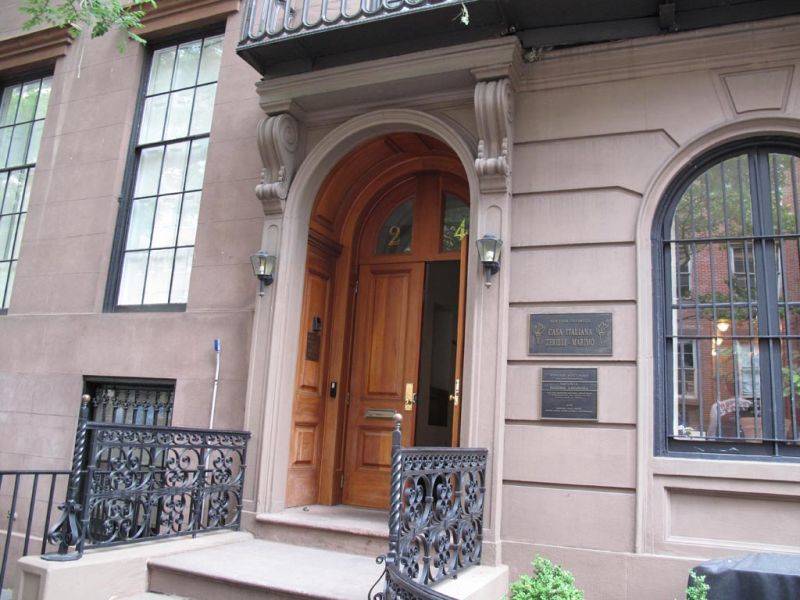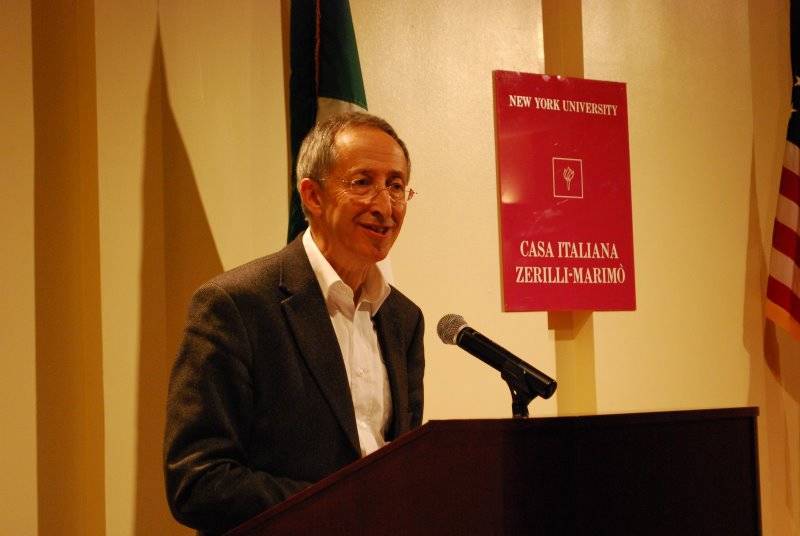Casa Italiana Zerilli Marimò at NYU. A Free Arena in the City
Lessons are over, but at Casa Italiana Zerilli Marimò you can still feel the buzz of culture. Yes, because even if students are resting at the seashore or preparing their final exams or thesis, there is somebody who is already planning a full calendar of activities for the next academic year.
The Director of the Casa, Stefano Albertini, welcomed us to his office a few days ago. Surrounded by shelves packed with movies and books of all sorts, we sat in front of his desk on the left of a cozy wood-paneled room. The conversation lasted for more than an hour, as we retraced the most significant moments of the past year at the Casa, and talked about the numerous initiatives the foundation will host and organize during the upcoming year.
Stefano Albertini, Clinical Associate Professor of Italian at NYU also has a true passion for Italian cinema, showing deep knowledge of both past and present cinematographic currents. The Casa is thus often involved in initiatives aiming to promote it in the United States. One of them is Open Roads, the Festival recently organized at the Lincoln Center in Manhattan by Professor Antonio Monda and Richard Peña, Director of the Film Society of Lincoln Center. The initiative, that takes the merit for bringing some of the most talented contemporary Italian directors and actors to New York and introducing their works to an American
(and multi-cultural) public, finds in the Casa one of its major supporters. Just as every year, indeed, its auditorium hosted a debate between the Italian artists participating in this ninth edition of the Festival and American and Italian students, who had a chance to discuss their work, their projects, and the contemporary situation of Italian cinema, its limits and its achievements with them. Prof. Albertini shared his opinion with us on this issue too, as our conversation touched a very thorny theme: the evident lack of cultural independence in Italy, and the limited support its diffusion and promotion has been enjoying in this latest period.
But there is still optimism and a great desire to do more for promoting Italian culture, both within and outside the country’s borders.
What to do, and what has been done? What are the Casa’s goals? How will it achieve them? We spoke about this too, remembering the goals that have been achieved to be proud of and mentioning those to be reached in the very near future.
We have divided the conversation in chapters, in order to give the reader a better chance to focus on the different issues we touched upon together.
THE PAST YEAR AT CASA ITALIANA
What has been the thread of this year’s event calendar at Casa Italiana?
“Our aim has always been to offer a free forum, where all ideas can be discussed. Academic freedom is the first principle that we respect. We do not receive fundings from any government agency, and this allows us to maintain great independency in our activities. We don’t have a real agenda: we just follow the idea that the university must be a sort of “agorà”, a square where people can go and share their opinions, which can also be very critical, and openly discuss them.”
Among all the events you organized this year, of which one are you most proud ?
I was very pleased with two documentary historical exhibits that we had, one dedicated to Brazzà and the other to Bassani. “Brazzà in Congo” was based on large educational panels, with photographs. There was very little of the artistic in it, but it narrated the story of this explorer who participated in the discovery of the Congo very well and it showed him to have very unusual views for his time, since he opposed the military occupation of Africa and the economic exploitations there. With Giorgio Bassani.” Il giardino dei libri" (Giorgio Bassani. The garden of books), on the other hand, we had his books, manuscripts, photographs, a significant collection that also gave us great visibility with the public and the media.
OPEN ROADS FESTIVAL AND ITALIAN CINEMA
What is the relationship between Casa Italiana and the Open Roads Festival?
The initiative is one of our staples. The idea at the basis of the Festival is to ask Italian directors and artists to come to New York together as a group. It is an occasion ‘to make the point’ about the situation of Italian cinematography. Thanks to the festival, we have the most interesting representatives of the Italian film industry. What I noticed that is very interesting is that they are also very pleased to do this because they don’t have many occasions to exchange ideas in Italy, so almost paradoxically they can do it only here. At the Casa, moreover, they also find a young audience with which they can confront and discuss things: many of the young people study Italian cinema, thus the conversation becomes interesting and constructive for both sides.
What is the situation of Italian contemporary cinema?
There are of course many problems and obstacles that limit the growth of the sector. The first, we all know, lies in the lack of funds. Since there are very few cinematographic entrepreneurs, most of the production in Italy is supported by government financing which can decide arbitrarily how the funds are distributed.
The second problem is the progressive closure of many small theatres throughout the country, which were those who usually screened independent, classic, Italian productions. Thus they really cannot find great channels of distribution anymore.
Finally, there is a problem regarding the audience. Who are the people who go to see Italian movies? What are they looking for? The list of the “top-ten” films is somehow discouraging: lots of people go to see the so-called ‘Panettone movies’ (a sort of contemporary B movies released during the Christmas period). When I go to Italy to visit or for work reasons, I rarely go to the cinema, since theatres rarely give much space to quality Italian productions. That is why as an Italian I am so happy we have Open Roads here in Manhattan.
And this is also why here at Casa we are so dedicated to the promotion of Italian cinema: we are committed to recognize and spread the works of great contemporary national masters. Just one name? Marco Bellocchio, who, in my opinion, has changed the way cinema is conceived since the 1960s. I think that his most recent film, “Vincere”, is stunning, fantastic, and the cast features excellent actors such as Giovanna Mezzogiorno and Filippo Timi. And Bellocchio is just one name. Only this year we also produced worldwide successes such as Garrone’s ‘Gomorrah’ and Sorrentino’s ‘Il Divo’.
Who are the people interested in Italian cinema here in New York?
Let me tell you, I was amazed to see how many people went to the Lincoln Center during the last days of the Open Roads Festival. The theatre was also packed during weekdays, at 2-3pm, which is something that rarely happens. This shows that there is great interest in Italian cinema here, there is an audience. Of course there are members of CineFile, the members of the Film Society of Lincoln Center, and many Italians who live here. And then there is also a large number of Americans that are in love with Italian cinema: they grew up with neo-realism, watching movies by Fellini, Visconti, Rossellini…masters that gave Italian cinema worldwide fame. These people sort of look for their disciples, and come to see Italian movies with great expectations. And there are of course young Americans, film students or Italian language students
What is the role of cinema today?
I think that there are some movies that can become a means to “denunciare”, denounce. Graduate students here at Casa Italiana organized a series of screenings named this year called “Denuncia. Speaking up in modern Italy”, giving Italian directors a chance to “export their message” to the USA. And I have to give them all the credit for this wonderful initiative. Of course, I don’t think that all the cinema di denuncia is good, but today this might be considered as an important role for both pictures and documentary productions.
NEXT YEAR AT CASA ITALIANA
What kind of initiatives are you organizing for the next academic year?
We are working on several levels. The program is not yet defined, but we are already working on some important projects. First of all, we will host a number of documentary historical exhibitions. One will be on Renata Tebaldi, the Italian soprano who was in competition all her life with Maria Callas. A second will be dedicated to Gabriele D’Annunzio, one of the greatest poets of the XX century in Italy. In this country he is rather well-known at the academic level, but the general public does not know much about him and his works, even though he had a moment of great popularity in his life in the United States too. D’Annunzio was a quintessential esthete, so we are collaborating with the Vittoriale museum to collect some of the objects he surrounded himself with. We believe that through them the public can better understand his personality.
Besides an artistic exhibit on prints by Alberto Burri, in November we will host a display dedicated to
Italian futurism, since this year the centenary of its birth occurs.
Most probably we will also collaborate with the Lincoln Center in the organization of a movie festival dedicated to Italian neo-realism. They will screen 90 films in their theatres, but we are willing to host events dedicated to the initiative here at Casa Italiana. This will be the largest retrospective dedicated to neo-realism that has ever been done.
We are also continuing our series “Adventures in Italian Opera” with Frank Plotkin and this year also our students will organize their own conference. Finally, as we have always done, we will host several concerts, readings, roundtables and debates, that will keep our calendar very busy and rich.
Finally, next year Casa Italiana will also celebrate the 20th Anniversary of its foundation…
Yes, in November 2010. Although it seems pretty far from now, we feel we need to get in the ‘celebratory mood’ pretty soon: we will hold a series of events dedicated to this special occasion throughout that month, so we are starting to plan well ahead.
Casa Italiana Zerilli-Marimò, home of the Department of Italian Studies at New York University, was born thanks to a generous and handsome donation from the Baroness Mariuccia Zerilli-Marimò.
Casa Italiana Zerilli Marimò is widely recognized for its extraordinary and continuous efforts in spreading and promoting Italian culture and history in New York. At 25 West 12th Street in Manhattan, American and Italian fellows, young students, intellectuals, and academics, find an open door where they can discuss, propose and participate in all kinds of activities and, most of all, learn and cultivate their passion for Italy. All of this is possible thanks to a fundamental principle, one value that the Casa has been championing since its very foundation. It is called “academic freedom”.








































i-Italy
Facebook
Google+
This work may not be reproduced, in whole or in part, without prior written permission.
Questo lavoro non può essere riprodotto, in tutto o in parte, senza permesso scritto.